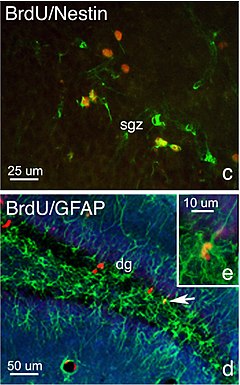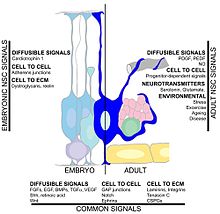神経発生


神経発生(ニューロン新生、神経新生、神経形成、英:neurogenesis)とは、神経幹細胞や前駆細胞から新たな神経細胞が分化する生理現象。胚や胎児期に最も活性化し、脳の形成や発達に重要な役割を果たす。成長するにつれて神経発生量は減少していくが、海馬や脳室下帯では成熟後も続くことが確認されている。
成体における神経発生[編集]

サンティアゴ・ラモン・イ・カハールなどによって述べられた初期の神経科学では、神経系は安定しており再生能力はないと考えられていた。しかし1962年に、ジョセフ・アルトマンによって成体哺乳類の大脳皮質にて神経発生の存在が確認され[3]、1963年には、海馬の歯状回で起こっていることが示された[4]。1969年には、嗅球へと顆粒神経細胞を供給する元としてrostral migratory streamが発見・命名された[5]。
アルトマンによるこれらの成果には確かな証拠がありながら長らく注目されることはなかった。しかし1982年にラットの神経発生が再び示され[6][7]、1983年には鳥類にも同様の現象が確認されたことで注目を集めるようになり[8]、1990年代には神経科学のメインストリームへと乗るようになった。そして1990年代の終わりには、霊長類やヒトの海馬で神経発生が確認され[9][10]、近年ではウサギの小脳でも確認されている[11]。
海馬や脳室下帯以外での神経発生についても示されているが[12][13][14]、それらはグリア細胞ではないかという異論もあり[15]、議論の対象となっている。抑制性の神経伝達物質として知られるγ-アミノ酪酸(GABA)は神経発生にも影響を与えていることが示され、またGABAの作用を増強するジアゼパムにも同様の影響が発見されている[16]。
役割[編集]
神経発生の明確な役割は解明されていないが、海馬での神経発生は学習や記憶に重要な役割があることが示唆されている[17]。このメカニズムについては様々な説が提示されている。例えば、新たな神経細胞によって記憶容量を増やしたり[18]、記憶同士の干渉を減少させたり[19]、記憶に時間に関する情報を与えたりといったものが上げられる[20]。神経発生の増減によってある種の学習能力が増減することは様々な研究によって確認されているが、神経発生をなくしても学習能力がなくなるわけではないことから、記憶や学習に必要不可欠なわけではないとされている[21]。また神経発生の過程で記憶が消えていく現象も確認されており、この研究結果によって乳幼児期の記憶喪失を説明することができる[22]。
制御[編集]

神経発生は様々な行動や生理現象に影響を受ける。運動や精神的に満たされた環境は海馬内での神経発生量を増加させ、新たな神経細胞が既存の神経細胞に統合する効率を上げる[23][24][25][26]。また脳疾患などによって中枢神経系に障害を負うことでも神経発生の量は増加する[27][28][29]。逆に慢性的なストレスや老化は、神経発生量を減少させる原因となる[30][31]。これらは循環系に流れるケモカインなどの様々な因子が原因となっているとみられている[17]。また睡眠不足によっても神経発生は減少する[32]。
神経発生はエピジェネティクスの影響を大きく受ける。脳室下帯の神経幹細胞はメチル化によって遺伝子の活性が変化することで分化の方向性が決定される。また多くのmiRNAは、発達期の皮質の大きさや層の形成に影響を与えていることが示されている[33]。
神経発生を増加させる化学物質も発見されている。うつ病の治療に利用される抗うつ薬は、神経発生を制御したマウスの神経発生量を増加させ行動を改善させる[34][35]。抗うつ薬は直接または間接的に、ストレスやうつ病によって損なわれる脳の柔軟性を改善させているとみられる[36]。大麻の主成分であるカンナビノイドは老化によって損なわれる脳機能を守る働きがあるとされ、神経発生の増加も確認されている[37]。しかし逆に、神経発生には何の影響もなく学習能力が低下することを示す研究も存在するため[38]、更なる研究が必要とされている。
応用[編集]
うつ病[編集]
神経発生とうつ病との関係を示唆する研究結果は多く発表されており、原因や治療法を求めて様々な研究が行われている。うつ病は遺伝的な原因を除けば、ストレスが最も大きな要因になると考えられ、またストレスは海馬内の神経発生を減少させる要因ともなる[30]。ラットを使った実験では、副腎を取り除くことで神経発生の量が増加することが示されている[39]。副腎はホルモンを生成する臓器であるが、ストレスに反応するとコルチゾールを分泌することでセロトニン受容体の活性を抑え神経発生も減少する[40]。またストレスに反応する別のホルモンであるコルチコステロンを与えることでも神経発生は減少する[39]。最も一般的な抗うつ薬は選択的セロトニン再取り込み阻害薬(SSRI)であることからも、神経発生との関係を示唆している。さらに神経細胞が成熟するまでには3〜6週間かかるが[41]、これは抗うつ薬によってうつ症状が改善するまでの期間と一致する。
神経変性疾患[編集]
神経発生は、アルツハイマー病やパーキンソン病などの神経変性疾患との関連も研究されている。アルツハイマー病患者や高齢者には、神経ステロイドであるアロプレグナノロンの減少がみられ、アロプレグナノロンを与えられたアルツハイマー病のマウスモデルには神経発生の増加と行動の改善がみられた[42]。パーキンソン病は黒質に位置するドーパミン神経の継続的な減少によって引き起こされるが、その前駆細胞を移植することで症状が改善することが示されている[43]。神経発生は線条体でも確認されているが[43]、ドーパミンの供給を絶つと前駆細胞の増殖が損なわれることが示されている[44]。神経発生を起こす因子について深く理解することで、これら神経変性疾患の治療法開発へとつながると考えられている。
脚注[編集]
- ^ Faiz M, Acarin L, Castellano B, Gonzalez B (2005). “Proliferation dynamics of germinative zone cells in the intact and excitotoxically lesioned postnatal rat brain”. BMC Neurosci 6: 26. doi:10.1186/1471-2202-6-26. PMC 1087489. PMID 15826306.
- ^ Oomen CA, Girardi CE, Cahyadi R, ''et al.'' (2009). Baune, Bernhard. ed. “Opposite effects of early maternal deprivation on neurogenesis in male versus female rats”. PLoS ONE 4 (1): e3675. Bibcode: 2009PLoSO...4.3675O. doi:10.1371/journal.pone.0003675. PMC 2629844. PMID 19180242.
- ^ Altman, J. (1962). "Are new neurons formed in the brains of adult mammals?". Science 135 (3509): 1127–1128. Bibcode:1962Sci...135.1127A. doi:10.1126/science.135.3509.1127. PMID 13860748
- ^ Altman, J. (1963). "Autoradiographic investigation of cell proliferation in the brains of rats and cats". The Anatomical record 145 (4): 573–591. doi:10.1002/ar.1091450409. PMID 14012334
- ^ Altman, J. (1969). "Autoradiographic and histological studies of postnatal neurogenesis. IV. Cell proliferation and migration in the anterior forebrain, with special reference to persisting neurogenesis in the olfactory bulb". The Journal of Comparative Neurology 137 (4): 433–457. doi:10.1002/cne.901370404. PMID 5361244
- ^ Bayer, S. A.; Yackel, J. W.; Puri, P. S. (1982). "Neurons in the rat dentate gyrus granular layer substantially increase during juvenile and adult life". Science 216 (4548): 890–892. Bibcode:1982Sci...216..890B. doi:10.1126/science.7079742. PMID 7079742
- ^ Bayer, S. A. (1982). "Changes in the total number of dentate granule cells in juvenile and adult rats: a correlated volumetric and 3H-thymidine autoradiographic study". Experimental brain research. Experimentelle Hirnforschung. Experimentation cerebrale 46 (3): 315–323. PMID 7095040
- ^ Goldman SA, Nottebohm F (April 1983). "Neuronal production, migration, and differentiation in a vocal control nucleus of the adult female canary brain". Proc. Natl. Acad. Sci. U.S.A. 80 (8): 2390–4. Bibcode:1983PNAS...80.2390G. doi:10.1073/pnas.80.8.2390. PMC 393826. PMID 6572982
- ^ Eriksson PS, Perfilieva E, Björk-Eriksson T, et al. (November 1998). "Neurogenesis in the adult human hippocampus". Nat Med. 4 (11): 1313–7. doi:10.1038/3305. PMID 9809557
- ^ Gould, E.; Reeves; Fallah; Tanapat; Gross; Fuchs (1999). "Hippocampal neurogenesis in adult Old World primates" (Free full text). Proceedings of the National Academy of Sciences of the United States of America 96 (9): 5263–5267. Bibcode:1999PNAS...96.5263G
- ^ Ponti G, Peretto B, Bonfanti L (2008). "Genesis of neuronal and glial progenitors in the cerebellar cortex of peripuberal and adult rabbits". In Reh, Thomas A. PLoS ONE 3 (6): e2366. Bibcode:2008PLoSO...3.2366P. doi:10.1371/journal.pone.0002366. PMC 2396292. PMID 18523645
- ^ Gould, E.; Reeves, A. J.; Graziano, M. S.; Gross, C. G. (1999). "Neurogenesis in the neocortex of adult primates". Science 286 (5439): 548–552. doi:10.1126/science.286.5439.548. PMID 10521353
- ^ Zhao, M.; Momma, S.; Delfani, K.; Carlen, M.; Cassidy, R. M.; Johansson, C. B.; Brismar, H.; Shupliakov, O.; Frisen, J.; Janson, A. (2003). "Evidence for neurogenesis in the adult mammalian substantia nigra". Proceedings of the National Academy of Sciences of the United States of America 100 (13): 7925–7930. Bibcode:2003PNAS..100.7925Z. doi:10.1073/pnas.1131955100. PMC 164689. PMID 12792021
- ^ Shankle; Rafii, M. S.; Landing, B. H.; Fallon, J. H. (1999). "Approximate doubling of numbers of neurons in postnatal human cerebral cortex and in 35 specific cytoarchitectural areas from birth to 72 months". Pediatric and developmental pathology : the official journal of the Society for Pediatric Pathology and the Paediatric Pathology Society 2 (3): 244–259. doi:10.1007/s100249900120. PMID 10191348
- ^ Rakic P (February 2002). "Adult neurogenesis in mammals: an identity crisis". J. Neurosci. 22 (3): 614–8. PMID 11826088
- ^ Song, J. et. al. “Neuronal circuitry mechanism regulating adult quiescent neural stem-cell fate decision”. Nature 489, 150–154 (06 September 2012) doi:10.1038/nature11306
- ^ a b G. Neves, G; S.F. Cooke and T.V. Bliss (2008). "Synaptic plasticity, memory and the hippocampus: A neural network approach to causality". Nature Reviews Neuroscience 9 (1): 65–75. doi:10.1038/nrn2303. PMID 18094707
- ^ Becker S (2005). "A computational principle for hippocampal learning and neurogenesis". Hippocampus 15 (6): 722–38. doi:10.1002/hipo.20095. PMID 15986407
- ^ Wiskott L, Rasch MJ, Kempermann G (2006). "A functional hypothesis for adult hippocampal neurogenesis: avoidance of catastrophic interference in the dentate gyrus". Hippocampus 16 (3): 329–43. doi:10.1002/hipo.20167. PMID 16435309
- ^ Aimone JB, Wiles J, Gage FH (June 2006). "Potential role for adult neurogenesis in the encoding of time in new memories". Nat Neurosci. 9 (6): 723–7. doi:10.1038/nn1707. PMID 16732202
- ^ Meshi D, Drew MR, Saxe M, et al. (June 2006). "Hippocampal neurogenesis is not required for behavioral effects of environmental enrichment". Nat Neurosci. 9 (6): 729–31. doi:10.1038/nn1696. PMID 16648847
- ^ Akers, G. Katherine. et. al. “Hippocampal Neurogenesis Regulates Forgetting During Adulthood and Infancy”. Science 9 May 2014: Vol. 344 no. 6184 pp. 598-602. DOI: 10.1126/science.1248903
- ^ Lazarov O, Robinson J, Tang YP, Hairston IS, Korade-Mirnics Z, Lee VM, Hersh LB, Sapolsky RM, Mirnics K, Sisodia SS (March 2005). "Environmental enrichment reduces Abeta levels and amyloid deposition in transgenic mice". Cell 120 (5): 701–13. doi:10.1016/j.cell.2005.01.015. PMID 15766532
- ^ van Praag H, Shubert T, Zhao C, Gage FH (September 2005). "Exercise enhances learning and hippocampal neurogenesis in aged mice". J. Neurosci. 25 (38): 8680–5. doi:10.1523/JNEUROSCI.1731-05.2005. PMC 1360197. PMID 16177036
- ^ Van Praag, H.; Kempermann, G.; Gage, F. (1999). "Running increases cell proliferation and neurogenesis in the adult mouse dentate gyrus". Nature Neuroscience 2 (3): 266–270. doi:10.1038/6368. PMID 10195220
- ^ Bjørnebekk A, Mathé AA, Brené S (September 2005). "The antidepressant effect of running is associated with increased hippocampal cell proliferation". Int J Neuropsychopharmacol 8 (3): 357–68. doi:10.1017/S1461145705005122. PMID 15769301
- ^ Jin K, Wang X, Xie L, et al. (August 2006). "Evidence for stroke-induced neurogenesis in the human brain". Proc. Natl. Acad. Sci. U.S.A. 103 (35): 13198–202. Bibcode:2006PNAS..10313198J. doi:10.1073/pnas.0603512103. PMC 1559776. PMID 16924107
- ^ Parent JM; Elliott, RC; Pleasure, SJ; Barbaro, NM; Lowenstein, DH (2006). "Aberrant seizure-induced neurogenesis in experimental temporal lobe epilepsy". Annals of Neurology 59 (1): 81–91. doi:10.1002/ana.20699. PMID 16261566
- ^ Gerber J, Tauber SC, Armbrecht I, Schmidt H, Brück W, Nau R (2009). "Increased neuronal proliferation in human bacterial meningitis". Neurology 73 (13): 1026–32. doi:10.1212/WNL.0b013e3181b9c892. PMID 19786694
- ^ a b Lee AL, Ogle WO, Sapolsky RM (April 2002). "Stress and depression: possible links to neuron death in the hippocampus". Bipolar Disord. 4 (2): 117–28. doi:10.1034/j.1399-5618.2002.01144.x. PMID 12071509
- ^ Sheline YI, Gado MH, Kraemer HC (August 2003). "Untreated depression and hippocampal volume loss". Am J Psychiatry. 160 (8): 1516–8. doi:10.1176/appi.ajp.160.8.1516. PMID 12900317
- ^ Mirescu C, Peters JD, Noiman L, Gould E (December 2006). "Sleep deprivation inhibits adult neurogenesis in the hippocampus by elevating glucocorticoids". Proc. Natl. Acad. Sci. U.S.A. 103 (50): 19170–5. Bibcode:2006PNAS..10319170M. doi:10.1073/pnas.0608644103. PMC 1748194. PMID 17135354
- ^ Hu, X.L.; Wang,Y. & Shen, Q. (2012). "Epigenetic control on cell fate choice in neural stem cells". Protein & Cell 3 (4): 278–290. doi:10.1007/s13238-012-2916-6. PMID 22549586
- ^ Malberg JE, Eisch AJ, Nestler EJ, Duman RS (December 2000). "Chronic antidepressant treatment increases neurogenesis in adult rat hippocampus". J Neurosci. 20 (24): 9104–10. PMID 11124987
- ^ Manev H, Uz T, Smalheiser NR, Manev R (January 2001). "Antidepressants alter cell proliferation in the adult brain in vivo and in neural cultures in vitro". Eur J Pharmacol. 411 (1-2): 67–70. doi:10.1016/S0014-2999(00)00904-3. PMID 11137860
- ^ Vetencourt, J. F. M.; Sale, A.; Viegi, A.; Baroncelli, L.; De Pasquale, R.; f. o'Leary, O.; Castren, E.; Maffei, L. (2008). "The Antidepressant Fluoxetine Restores Plasticity in the Adult Visual Cortex". Science 320 (5874): 385. doi:10.1126/science.1150516. PMID 18420937
- ^ Jiang, W., et al. (2005). "Cannabinoids promote embryonic and adult hippocampus neurogenesis and produce anxiolytic- and antidepressant-like effects". The Journal of Clinical Investigation 115 (11): 3104–3116. doi:10.1172/JCI25509. PMC 1253627. PMID 16224541
- ^ Wolf, Susanne A; Bick-Sander, Anika; Fabel, Klaus; Leal-Galicia, Perla; Tauber, Svantje; Ramirez-Rodriguez, Gerardo; Müller, Anke; Melnik, Andre; Waltinger, Tim P; Ullrich, Oliver; Kempermann, Gerd (2010). "Cannabinoid receptor CB1 mediates baseline and activity-induced survival of new neurons in adult hippocampal neurogenesis". Cell Communication and Signaling 8 (1): 12. doi:10.1186/1478-811X-8-12. PMID 2898685
- ^ a b Jacobs, B. L., H. van Praag, F. H. Gage (2000). "Depression and the Birth and Death of Brain Cells". American Scientist 88.
- ^ Kandel, E. R., J. H. Schwartz and T. M. Jessell (2012-10-26). Principles of Neural Science, fifth edition. ISBN 0071390111
- ^ Davies-Sala, M. G., Espósito, M. S., Piatti, V. C., Mongiat, L. A., Trinchero M. F., and Schinder A. F. (25 May 2011). "The Timing for Neuronal Maturation in the Adult Hippocampus Is Modulated by Local Network Activity". The Journal of Neuroscience. 31(21).
- ^ Marx CE, Trost WT, Shampine LJ, et al. (December 2006). "The neurosteroid allopregnanolone is reduced in prefrontal cortex in Alzheimer's disease". Biol. Psychiatry 60 (12): 1287–94. doi:10.1016/j.biopsych.2006.06.017. PMID 16997284
- ^ a b Arias-Carrión O, Freundlieb N, Oertel WH, Höglinger GU (October 2007). "Adult neurogenesis and Parkinson's disease". CNS Neurol Disord Drug Targets. 6 (5): 326–35. doi:10.2174/187152707783220875. PMID 18045161
- ^ Höglinger GU, Rizk P, Muriel MP, et al. (July 2004). "Dopamine depletion impairs precursor cell proliferation in Parkinson disease". Nat Neurosci. 7 (7): 726–35. doi:10.1038/nn1265. PMID 15195095